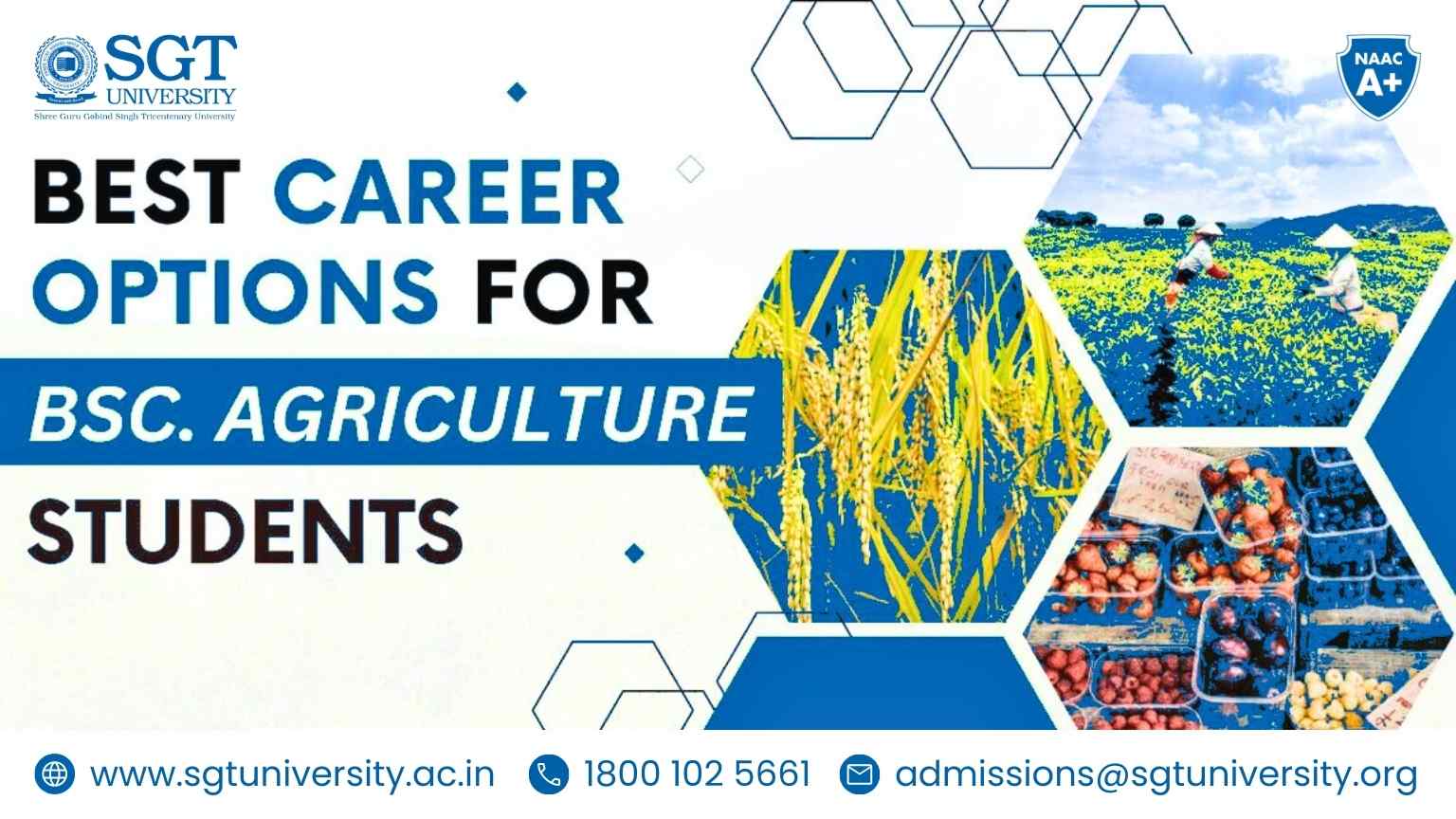Why B.Sc. Agriculture?
Approximately 65 percent of the population is dependent on agriculture in India for their livelihood. India’s varying climatic condition highly supports the diversification of crops and their varietal development. The modern agriculture sector proves helpful in generating human resource to support other sectors within imparting knowledge, linking farmers with researchers and also extending extension services in the overall development of the national economy.
As saturation comes in the most sought for courses like engineering and medical fields, B.Sc. in agriculture offers a silver lining for the admission seekers. Careers in agriculture safeguard the idea of standing away from the general crowd. The course curricula of B.Sc. (Hons.) Agriculture course emphasizes all core areas of agriculture embedded with agriculture heritage of India. This program is the first step in the ladder towards modern agriculture by adopting improved technologies and practices including the most talked off organic farming. The study of modern agriculture leads to better farm yields along with much needed environmental protection and sustainable growth. Keeping in pace with recent advances in different areas of agriculture, the objectives of B.Sc. (Hons.) Agriculture is to nurture young scholars, tap their potentials and groom them to become valuable contributors to the much needed second Green Revolution.
Through passion and perseverance, students can explore how things work and how impossibilities can be turned into realities by studying agriculture. The vast curriculum of B.Sc. Agriculture is highly enriched with various courses like agronomy, soil science, entomology, horticulture, plant physiology, agricultural engineering, agricultural economics, applications of biotechnology, post-harvest management, etc. The syllabi recommended by the ICAR provide detailed knowledge of various streams under agriculture & allied fields and allows the student to choose his/her area of interest for establishing their career. During the four years, they are exposed to different teaching methodologies including refining their communication and expression skills.
What is learnt in 4-year degree of B.Sc. Agriculture?
The agriculture course provides theoretical as well as practical knowledge of the progressive aspects of modern agriculture along with addressing sustainability, which is a must in the current fragile ecosystem.
Besides building expertise through well planned on-field implementation and testing of basic concepts in better production with higher yields resistant to various diseases and value addition of food and flora it also prepares the students in marketing skills of agriculture products, which is need of the hour in the plethora of unemployment.
The learning outcome of various components is:
- RAWE (Rural Agricultural Work Experience): Under this programme, the students are exposed to real life rural settings with the aim to develop a sense of awareness so that the students can understand the day to day problems of farmers and rural folks. Budding graduates acquire relevant practical experience required for efficient working in agricultural and allied fields wherein they can gauge the difference between what is taught and what is applicable in the field.
- Experimental Learning– Under this component, the students undergo training in different organizations and NGOs and attend Industry Interaction Programs, Seminars and Workshops etc. These events offer the students an opportunity to observe and assimilate the structure, the organizational traits and the business environment of the industry and develop communication skills, analytical abilities and gain awareness regarding the prerequisites of job requirements in all sectors.
- Educational Visits – It includes regular visits to different KVKs (Krishi Vigyan Kendra), major agricultural institutes and research centres to understand the basic framework of research and gaining practical knowledge.
- Agri-business: Entrepreneurial ventures in agriculture are the utmost need of the hour to support the farming industry as well as the economy by developing agri-entrepreneurial skills in students.
Besides above mentioned components, education in agriculture unlocks the mysteries and struggles to solve problems related to abiotic and biotic stress in crops which result into crop loss and lower productivity by combining the expertise with help of major components like agronomy, horticulture, weed sciences, plant pathology, plant breeding, soil science, genetic engineering, agricultural entomology, agricultural economics, etc. in order to protect the crops ensuring food security and sustainable agriculture.
Therefore, the course provides crucial information about the various projects developed after independence and their major role in improving the farming lot and economy of our country. The student also receives knowledge of social forestry tree species used in agriculture, their role and importance in sustaining food chain, food web and biodiversity.
The course inculcates an overall understanding and bearing importance of the impact of globalization and diversity in modern agriculture organizations and prepares the students in critical thinking, analysis and problem-solving. It develops an understanding of current events and present issues in agriculture and their bearing in future agriculture. Students precisely learn to examine the relationships between inputs and outputs to boost profitability. They will understand the employer’s characteristics and decision-making, which in turn will enhance the success of any agricultural enterprise.
Career opportunities after completion of Bachelor of Agriculture
With the application of advanced agricultural technologies in the modern world, there’s a lot of scope in bringing out new horizons towards increasing standards of agriculture.
Therefore, for agriculture graduates, major domains within the ambit of the agricultural sector include:
- Higher education and research fields in public and private institutions.
- The State Department of Agriculture and Horticulture as Agricultural Development Officers (ADOs) and Horticulture Development Officers (HDOs), respectively.
- In public and private sector banks as Rural Development Officers (RDOs).
- Soil Conservation and Soil Testing Division, Department of Agriculture as Trainee Officers
- Various fertilizer organizations as Technical Personnel
- The graduates can also find various options in pesticides and seed companies, starting from Management Trainee to Marketing Officer in Marketing Division; Research Officers in Research & Development Division, etc.
- They can also find employability as Technical Personnel in various food and seed processing industries.
- In sugar industries in various capacities.
- Can adopt agri business as a profession.


